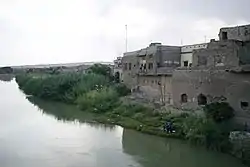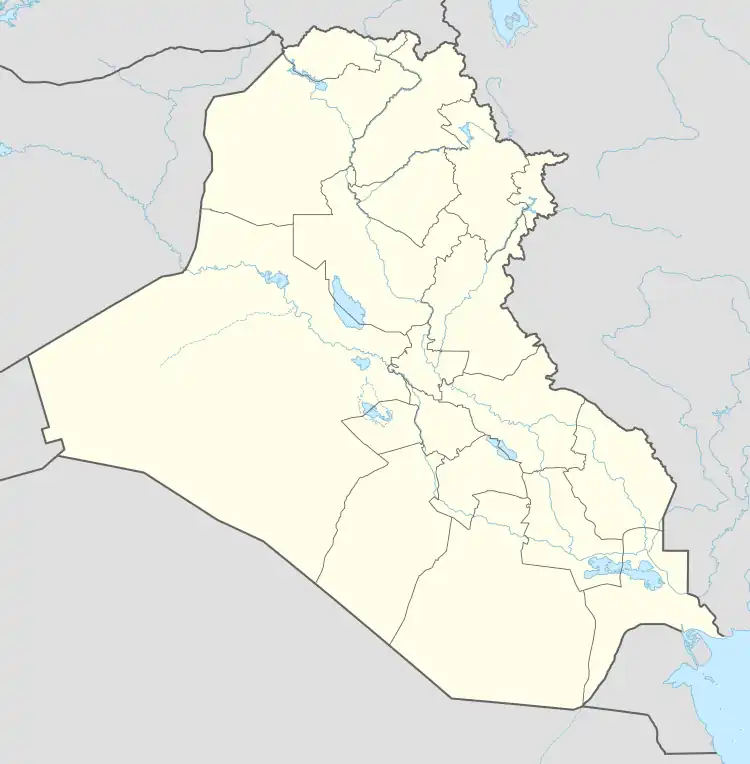Altun Kupri
Altun Kupri (Arabic: التون كوبري,[3] Turkish: Altınköprü, lit. 'Golden Bridge',[4] Kurdish: پردێ, romanized: Pirdê[5][6]) is a town in Kirkuk Governorate, Iraq. Its inhabitants are predominantly Turkmen, with a minority of Arabs and Kurds.[7][8][9] It is located on the shores of the Little Zab and on the Erbil–Kirkuk road.[10][11] The town is described as having an 'intrinsic strategic significance' and is disputed.[12][13]


Altun Kupri | |
|---|---|
Town | |
 | |
 Altun Kupri Location in Iraq | |
| Coordinates: 35°45′12″N 44°08′37″E | |
| Country | |
| Governorate | Kirkuk Governorate |
| District | Dibis |
| Elevation | 284 m (935 ft) |
| Population (2013)[2] | |
| • Total | 9,275 |
Etymology
Altun Kupri is the Anglicized version of the Iraqi Turkmen word for "altın köprü" in standard Turkish language, which is literally 'Golden Bridge' in English.[4]
There are different theories for the town's name. Some believe that 'Golden Bridge' refers to a Turkish or Kurdish woman of that name, while others believe it refers to the colorful caravans that passed the town and its bridge on their way between Mosul and Baghdad.[14]
History
Ottoman Sultan Murad IV built two bridges in the town which made it gain importance. It was visited by many European travellers and known for its scenery.[14]
Altun Kupri had approximately 400 to 500 households by the end of the 18th century. Mirza Abu Taleb Khan visited the town in 1799, describing it as a big village with a mixed Kurdish and Turkmen population busy with farming. Moreover, it was a trading center between Kurdistan and Baghdad for figs, grapes and other agricultural products. Under the reign of Muhammad Pasha of Soran (1813-1836) he was able to extend his influence to this town and force the Ottoman governor of Baghdad to recognize his control.[15] In 1906, the town had 4,000 inhabitants.[16] The Ottomans destroyed the town's famous stone-built bridges in 1918 and replaced it with modern steel constructions.[14]
In 1925, the town's population was predominantly Turkmen.[17]
The town experienced Arabization during the Saddam era and an increased militarization to counter uprisings in the north from spreading towards Kirkuk.[18]
More than a hundred Turkmen civilians were killed in the 1991 Altun Köpru massacre during the Gulf War by the Iraqi Army.[19]
Demographics
In the 1947 census Kurds constituted 70% of the population but decreased to 50% in 1957. In the census of 1965, the percentage of Kurds fell further to 25.7% but increased again to 75.6% in 1977.[20] In the 2005 elections, the DPAK received 80% of the vote in the sub-district of Altun Kupri.[21]
References
- "Maps, Weather, and Airports for Altun Kubri, Iraq". Fallingrain.com. Retrieved April 3, 2019.
- "World Gazetteer # Altun kupri". Archived from the original on 2013-02-09. Retrieved 19 September 2013.
- "تركمان العراق يحييون الذكرى الـ28 لمجزرة "ألتون كوبري"". Anadolu Agency. 28 March 2019. Retrieved 29 October 2020.
- Blackie, Christina (1887-01-01). Geographical Etymology: A Dictionary of Place-names Giving Their Derivations. John Murray.
- "ناحیەی پردێ جارێكی دیكە ئاگر لە دەغڵودانی جوتیاران بەربوو". Xelk.org (in Kurdish). Archived from the original on 25 December 2019. Retrieved 21 December 2019.
- "Pêşmerge: Li Pirdê pêşmergeyan êrîşên dagirkeran têk şikandin". Rupelanu.com (in Kurdish). 20 October 2018. Retrieved 21 December 2019.
- "Clashes between Kurdish and Iraqi forces near Erbil". The National News. 20 October 2017. Retrieved 29 October 2020.
- "Iraq after ISIL: Kirkuk". Retrieved 26 October 2020.
- "Report : Iraq: Security situation and internally displaced people in Kirkuk province" (PDF). Landinfo.no. June 2015. Retrieved 9 March 2022.
- "Altun Kupri town, dated July 1919 / Catalog Record Only". Library of Congress. 1919. Retrieved 29 October 2020.
- "Kirkuk – Erbil road re-opens days after bridge maintenance". Kurdistan24. 8 April 2019. Retrieved 29 October 2020.
- "Report: Altun Kupri town seized from Kurdish Peshmerga". Al Jazeera. 20 October 2017. Retrieved 29 October 2020.
- Knights, Michael (2010). "Kirkuk in Transition Confidence Building in Northern Iraq" (PDF). Policy Focus. p. xi. Archived from the original (PDF) on 12 November 2020. Retrieved 26 October 2020.
- Longrigg, S.H. (24 April 2012). "Alti̊̊n (Altūn) Köprü". Encyclopaedia of Islam, Second Edition. doi:10.1163/1573-3912_islam_SIM_0568.
- Ghalib, Sabah Abdullah (2011-10-13). "The Emergence of Kurdism with Special Reference to the Three Kurdish Emirates within the Ottoman Empire 1800-1850".
{{cite journal}}: Cite journal requires|journal=(help) - Rasoul, Rasoul Muhammed (2017). "History of Kirkuk from the Beginning of the Nineteenth Century until Becoming Part of the Iraqi Monarchy in 1925" (PDF). University of Erfurt: 6–7.
{{cite journal}}: Cite journal requires|journal=(help) - Question of the Frontier between Turkey and Iraq - League of Nations. 1925. p. 38.
- Knights, Michael (2010). "Kirkuk in Transition Confidence Building in Northern Iraq". Policy Focus. p. 9. Retrieved 26 October 2020.
- "28 years on, Iraq's Kirkuk remembers Turkmen massacre". Anadolu Agency. 27 March 2019. Retrieved 29 October 2020.
- Ihsan, Mohammad, Administrative Changes in Kirkuk and Disputed Areas in Iraq 1968-2003, pp. 24–25
- Kane, Sean (2011). "Iraq's Disputed Territories" (PDF). p. 28. Retrieved 24 October 2020.